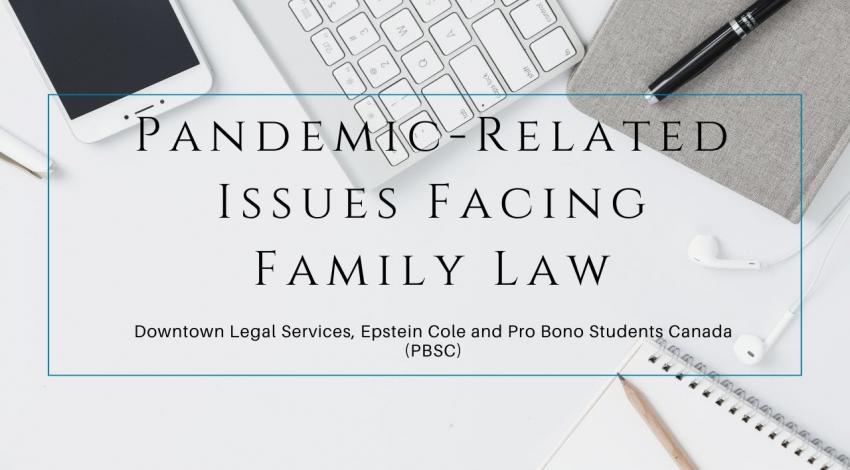The family unit
Nexus/Spring 2022
by Michael McKiernan
Six years on from her law school graduation, Faria Soutter (JD 2016) feels like she has never really left the Downtown Legal Services (DLS) family division.
The family lawyer, who practises with Toronto firm Beaton Burke Young LLP, is transported back to the Fasken Building at 655 Spadina Ave. every time she starts a family case in court on behalf of a client.
“The first affidavit I ever drafted was at DLS, and it’s also where I prepared my first motion materials. Really, it’s where I learned about the whole family law process,” Soutter says.
She also returned in person earlier this year, needing little encouragement to fill in for the family division’s staff lawyer Richard Teicher while he was away on vacation.
“I loved the clinic. I think it still may be my happiest place in family law to date,” Soutter says.
After getting lucky in the lottery for a volunteer spot at DLS in her first year at the Faculty of Law, Soutter worked over the summer in the family law division before joining the clinic’s student executive committee in her upper years.
“It’s one of the most unique opportunities to be able to get real client and court experience, which was very appealing to me,” she says. “I think it also gave me a real advantage as a student looking for a job in a super-competitive market, and helped me get a position in a family law firm. Instead of starting from zero, I was able to go in and hit the ground running.”
Almost four decades earlier, the hands-on nature of clinic work was also what attracted Frank de Walle (LLB 1980) to DLS, then known as the Toronto Community Legal Assistance Service.
“I’ve always been pragmatic; I find that I learn better with the cookbook, in the kitchen making the recipe, rather than in the abstract in class. It sticks a lot better if I’m implementing it at the same time,” he explains.
In fact, de Walle says students needed to be prepared to go in at the deep end if they wanted to thrive at the clinic in the late 1970s when he got involved, first as a volunteer, and then for academic credit in his final year.
“You were just sort of sent in there and left to it. You took whoever came in needing help, whether it was landlord-tenant, criminal, family, or employment issues.”
Still early in its transition from student-led initiative to academic curriculum mainstay, the clinic had only recently hired its first full-time review counsel, whose time was spread thin among the student staff providing services to clients.
“Guidance was something that was missing,” says de Walle, who remains otherwise full of fond memories from a DLS stint that laid the foundations for the general practice he opened in Lethbridge, AB soon after his graduation in 1980.
“It certainly assisted my ability to interview, assess and learn about clients in a way that another course in securities law would not have.And it felt good helping people in the crosshairs of the system who just needed a listening ear. It was win-win-win.”
According to Teicher, student supervision is one of the areas in which DLS has undergone the largest transformation over its years in operation. These days, he is one of five full-time staff lawyers.
“We’re all on site, and we don’t do anything else, so the level of interaction students get with counsel is amazing,” Teicher says.
His family division students serve clients with a wide array of legal issues, including parenting time, decision-making authority, child or spousal support, and family violence. The only family law matters DLS steers clear of are divorces and property division cases, which do not fit within the clinic’s poverty law mandate, and child protection cases, which are reserved for the most experienced family law counsel due to their sensitivity.
Since his call to the bar in 2000, Teicher has come at family law from almost every angle, practising at a large Bay Street firm, a boutique family law outfit and as a sole practitioner, as well as in government for Ontario’s Ministry of the Attorney General.
When he joined DLS in 2014, Teicher took charge of not only the clinic’s family division, but also its brand new social work support program, building on his own pre-law qualifications in the area. Teicher says the Masters students from the University of Toronto’s Factor-Inwentash Faculty of Social Work integrate easily with the clinic’s family law students because of the complementary nature of the professions.
“When I was in practice in family law, I often wished I had access to a social worker for some of the problems that my clients were dealing with that were not strictly speaking legal issues,” he says.
Myles Goodman-Vincent, a second-year law student currently working part-time at DLS under Teicher’s supervision, had his eyes on a family division placement from the moment he entered the Faculty of Law.
“It’s an area of the law that people can relate to, whether they’ve sought assistance from a lawyer themselves or know someone engaged in the process,” he says.
The highlight so far was a two-day trial conducted with Teicher in the Ontario Court of Justice, where they succeeded in obtaining a restraining order for their female client against the father of her children. The judge also agreed to their request that the woman be able to obtain government documentation for the children and travel without the father’s consent.
“It’s been incredibly impactful for me. I’ve gained more of an understanding of the social context in which the law operates, and how to approach a person’s experience holistically, rather than focussing on their strict legal issue,” Goodman-Vincent says. “In other areas of the law, you go to court and get a judgment, and that’s the end of the story. But with family law, it’s often not the case. For example, when you have people raising a child together.”
Jennifer Wall (JD 2012), a predecessor of Goodman-Vincent’s, says the clinic’s extensive support network of fellow students and staff lawyers provided her with a controlled environment to confirm her suspicion that family law was her calling.
“The stakes were lower because there was so much feedback and supervision going on. You know that someone will catch your mistakes,” she says. “It’s like having training wheels.”
Now very much in full flight on two wheels, Wall is a partner at Harrison Pensa LLP in London, ON, where she heads the firm’s family law group.
“The clinic is a special place. The level of care and effort that goes into these files is providing a huge community service,” she adds.
Maintaining that service into the future is a challenge that drives Teicher. DLS receives the bulk of its funding from Legal Aid Ontario, and each faces demand for its services that far outstrips the available supply.
“We always seem to be in a state of flux, but we’re trying to get better all the time,” Teicher says. “We try to take on as many clients as we can, knowing that some will require more care and time in terms of the resources we have to devote to them. It’s always a balancing act.”
In addition, family law has been hit particularly hard by the country’s access to justice crisis, as shrinking legal aid funding and the rising cost of private counsel put legal representation out of reach for many. According to Statistics Canada, 58 per cent of family law litigants were self-represented in active cases during the fiscal year 2019-2020, a proportion that has increased in every one of the last five years.
Still, the clinic’s experience during the COVID-19 pandemic gives Teicher some cause for optimism.
“Everyone talks about the pivot to supplying services in a virtual environment, but we did it, and we didn’t miss a day,” he says. “I’m not sure everyone can say that, and I’m proud to be part of such a dynamic organization.”
Despite creating a whole new set of delays and processing issues, Teicher says the pandemic has also forced the court system to take large steps forward in terms of technology, embracing remote hearings and electronic filing in ways that were previously unthinkable.
“Things are changing fast and for the better. The challenge for us is to make sure that nobody gets left behind.”
Michael McKiernan is a legal affairs writer from St. Catharines, Ontario.
Image by Kelli Mcclintock via Unsplash

